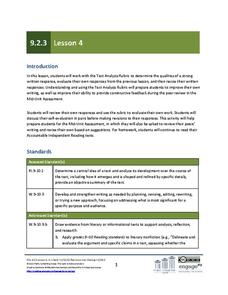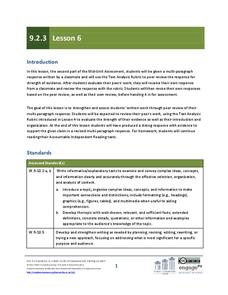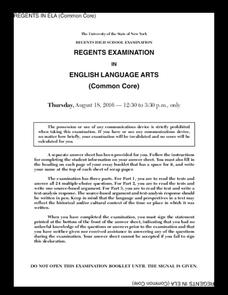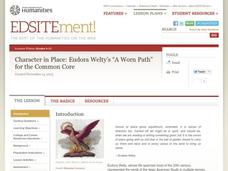Curated OER
Magical Musical Tour: Using Music Lyrics to Teach Literary Elements
While music lyrics are often used to teach literary elements, the richness of this resource comes from the wealth of exercises, activities, and support materials provided in the packet. Although designed for gifted learners, the...
EngageNY
Grade 9 ELA Module 2, Unit 3, Lesson 4
What are the qualities of a strong written response to a prompt? Class members use the provided text analysis rubric to self-assess their responses to their homework assignments to prepare for the mid-unit assessment.
Saddleback College
How to Find the Main Idea
What's the difference between the main idea of a text and the topic? Take kids through the process of literary analysis with a presentation about finding the main idea and supporting details. Additionally, it guides learners through...
Literacy Design Collaborative
Using Textual Evidence to Analyze Literary Responses to Historical Events
Scholars analyze Animal Farm to learn how to add textual evidence into essays to support their ideas. They search for a deeper meaning to the story and how it relates to the text Totalitarianism and Revolutions in Russia. To finish,...
Maryland Department of Education
The Concept of Identity Lesson 4: The Psychological Approach
Readers apply Sigmund Freud's theories of the unconscious mind and the psychological approach to literary criticism to analyze and evaluate the relationship between two characters in A Separate Peace.
Maryland Department of Education
The Concept of Identity Lesson 2: The Historical/Biographical Approach
"How does our environment shape our identity?" After researching biographical information about John Knowles and considering how these experiences are reflected in A Separate Peace, class members consider the strengths and weaknesses of...
We are Teachers
Read Like a Detective
Encourage your young readers to become true detectives in their next literary adventure! Here you'll find an attractive display that will prompt your learners to constantly be looking for clues, asking questions, making cases about the...
Benjamin Franklin Tercentenary
The Autobiography of Benjamin Franklin
Need a model for character education? Benjamin Franklin presents himself as in a constant state of striving to become the man he hoped to be, making his autobiography is far more accessible to learners than those of people who consider...
Literacy Design Collaborative
Elie Wiesel's Acceptance Speech Analysis
Elie Wiesel's Nobel Prize Acceptance speech provides young historians with an opportunity to demonstrate their ability to use evidence from the speech. They work together to analyze how Wiesel uses rhetorical devices and syntax to...
New York State Education Department
English Language Arts Examination: January 2017
After reading literary and informational texts, scholars answer multiple-choice questions and write both a source-based argument and a text-analysis response.
EngageNY
Grade 9 ELA Module 2, Unit 3, Lesson 6
As part of a mid-unit assessment, class members exchange their draft of a multi-paragraph essay with a classmate, review their partner's writing using the provided text analysis rubric, and evaluate the strength of evidence, the...
What So Proudly We Hail
Life, Liberty, and the Pursuit of Happiness: A Lesson on the Declaration of Independence
What does it mean to say that a right is unalienable? How did the founding fathers convey this revolutionary concept in the Declaration of Independence? Engage in a close reading and analysis of the Declaration of Independence, and...
Curated OER
Abigail and Her Sisters
The 10th lesson in this series has researchers examining a packet of letters from Abigail Adams to her sisters. Scholars note examples of the themes that appear throughout the letters.
New York State Education Department
English Language Arts Examination: August 2016
If it's true that preparation is the key to success, the English Language Arts Examination handout should help pupils ace their exams. Scholars read several texts and answer multiple-choice questions. Then, they write source-based...
Maine Content Literacy Project
Introduction to Literacy Criticism
As learners continue to examine a short story of their choice, they take some time to look at analysis completed by others on the same story. In the eleventh lesson in a series of fourteen, pupils explore various sites for literary...
Maryland Department of Education
The Concept of Identity Lesson 5: Motivation - Maslow's Hierarchy of Needs
Maslow's Hierarchy of Needs provides the lens class members use to analyze and evaluate the motivations of the characters in Sylvia Plath's "Initiation" and scenes from Mean Girls. Readers then select a character from A Separate...
ReadWriteThink
Heroes Are Made of This: Studying the Character of Heroes
What makes heroes and villains? A six-part unit plan asks young scholars to explore the concept of heroism and the characteristics they consider heroic and unheroic. Groups create character maps that focus on how characters are shaped by...
iCivics
Lesson 3: Bias
How do journalists balance bias and ethical reporting? The final lesson in a series of five from iCivics examines the different types of bias and how they affect the news we read. Young reporters take to the Internet to find examples of...
Curated OER
Persona in Autobiography
A talkative old man? A naïve believer in Human Perfectibility? A Sage? Who is this guy, anyway? The Autobiography of Benjamin Franklin launches a study of the way Franklin uses structure, style, and purpose, as well as different...
National Endowment for the Humanities
Character in Place: Eudora Welty’s “A Worn Path” for the Common Core
How do writers use the interaction between elements like characterization and setting to create meaning? Readers of "A Worn Path" create a series of comic book-style graphics of Eudora Welty's short story and reflect on how Welty uses...
EngageNY
Grade 9 ELA Module 3, Unit 1, Lesson 1
Clear up the misconceptions about autism and individuals on the autism spectrum with an inquiry-based instructional activity. As ninth graders read the first four pages of Temple Grandin's Animals in Translation: Using the Mysteries of...
Santa Ana Unified School District
The Giver
Wouldn't it be great to live an a community without pain, without danger? Such a society is the goal of the community in The Giver. Using Lois Lowry's dystopian novel as the core text, class members read primary source materials about...
Illinois State Board of Education
Common Core Teaching and Learning Strategies
Here's a resource that deserves a place in your curriculum library, whether or not your school has adopted the Common Core. Designed for middle and high school language arts classes, the packet is packed with teaching tips, materials,...
National Endowment for the Humanities
The Rise and Fall of Joseph McCarthy
"I have here in my hand . . ." The war against Communism and Joseph McCarthy’s place in it are the focus of a series of lessons examining postwar America from 1945-1954. Joseph McCarthy takes center stage in this, the final lesson of the...
Other popular searches
- Literary Analysis Plot
- Literary Analysis Paper
- Literary Analysis for Poetry
- 9th Grade Literary Analysis
- Literary Analysis on Quotes
- Writing Literary Analysis
- Literary Analysis the Hobbit
- Test for Literary Analysis
- Literary Analysis Pocahontas
- Writing a Literary Analysis
- Literary Analysis Essay
- Literary Analysis Plays

























